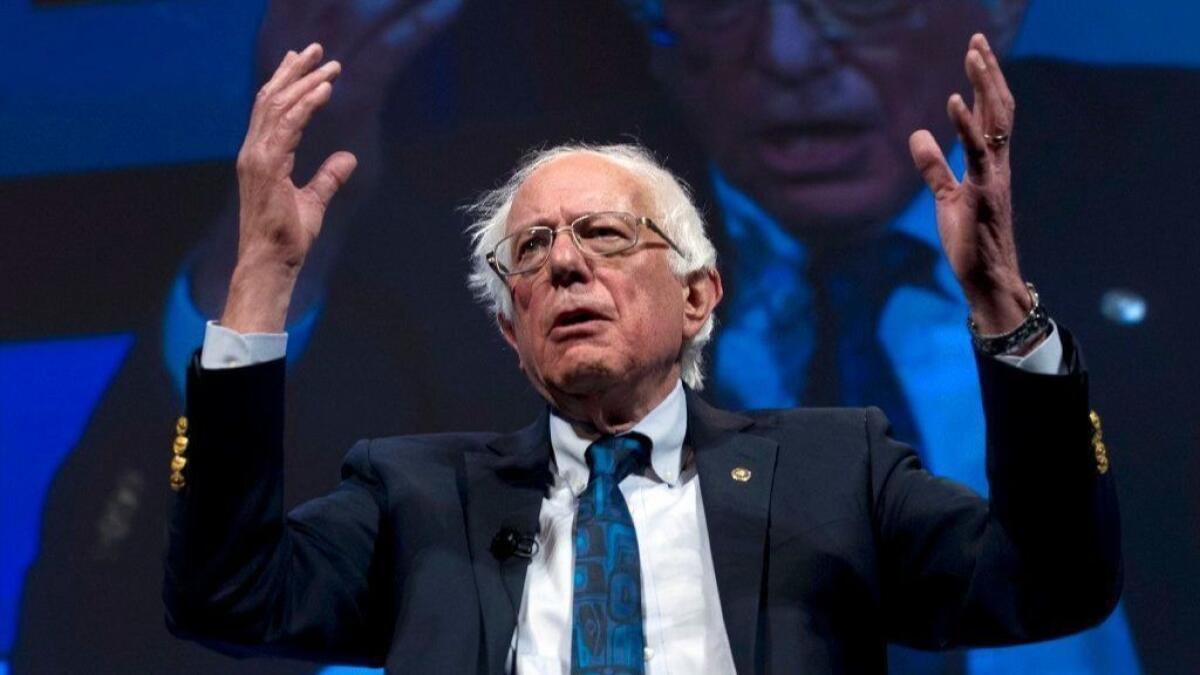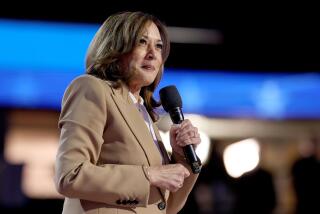Bernie Sanders’ immense fundraising haul reflects a resilient movement

Reporting from Washington — Bernie Sanders put to rest any suggestion that the movement behind him has faded since his first run for president as his campaign team announced Tuesday that he had raised an immense amount of cash from a huge number of donors.
Sanders’ campaign collected $18.2 million from 525,000 donors — most of them under age 39 — in the first quarter of 2019, campaign officials said. The intimidating show of financial force will probably position Sanders to compete aggressively in every key state, giving him more resources than most of his Democratic rivals. Eighty percent of the donors had given to a previous Sanders campaign, reflecting his durability as a candidate.
Sanders’ fundraising announcement was one of several events in recent days that have begun to shape the contours of a presidential race that has already veered in some unexpected directions.
Among those was another cash haul by a candidate whose profile is very different from that of Sanders.
Until a few weeks ago, South Bend, Ind., Mayor Pete Buttigieg barely had a public profile. But the bookish Navy veteran caught fire after a CNN town hall performance that inspired the audience and launched him toward political stardom.
By the end of March, Buttigieg had raised some $7million from more than 158,000 donors, his campaign announced Monday. That earned him the ability to launch professional campaign operations in key primary states and a place on the stage of the Democratic presidential debates.
The Buttigieg story illustrates how wide open this race is. The mayor of a city of just 102,000 in the heart of a red state, he recently jumped to third place in an Emerson poll of likely Iowa Democratic caucusgoers, with 11% choosing him. He had no support in the same poll two months ago.
Early this year, even those in political activist circles who were aware of Buttigieg knew him mainly as a loser: He failed in a run to be chairman of the Democratic National Committee in 2017. Now, even his husband — the charismatic and social-media-savvy Chasten Buttigieg — has a national following.
Whether Buttigieg is a rising star or a shooting one enjoying a fleeting moment will become clearer as the race lumbers on.
But for the time being, the mayor has more small donors than a well-known senator from the nation’s most populous state, whose own fundraising numbers were impressive. Sen. Kamala Harris of California disclosed numbers Monday that reflected strong nationwide support. She raised $12million from 138,000 donors nationwide.
Campaigns must report their first-quarter fundraising and spending to the Federal Election Commission by mid-April. Those with good stories to tell often report their own numbers in advance of the public disclosure deadline.
At the same time, some of the party’s stars who entered the race with impressive fundraising histories seem to be struggling. Sens. Elizabeth Warren of Massachusetts and Kirsten Gillibrand of New York have so far avoided releasing information about the money they’ve raised, signaling the numbers are not robust.
Warren’s halting start is particularly unexpected. She has been mired in the single digits in most polls, even coming in behind Buttigieg in the Emerson survey. She never released a first-day fundraising total after she launched her exploratory committee Dec. 31 — but, based on filings by the fundraising site Act Blue, it has been estimated at as little as $300,000. That’s a fraction of what flowed in for Sanders or former Texas Rep. Beto O’Rourke after their entries into the race.
Those struggles come despite Warren’s many big advantages when she announced her candidacy. She had high name recognition and a broad national following, having been a favorite of the party’s left wing for years. In 2016, she had been seen as a potentially formidable opponent to Hillary Clinton, who was viewed with suspicion by many on the left, but the Massachusetts senator rejected the entreaties of a “draft Warren” movement.
She was the first major candidate to announce in the 2020 race, but was hobbled by controversy over her release of a DNA test to prove her claim to having Native American ancestry.
Warren has been dominating the field when it comes to policy pronouncements, issuing an array of ambitious, detailed proposals on taxes, antitrust policy, child care and more. But voters so far seem to be more moved by political calculations than policy smarts.
For Sanders, whose average contribution in the first fundraising quarter was just $20, the largest number of donors came from California. Some 97,000 Californians gave to him, reflecting his strength even in a state with its own strong candidate, Harris, on the ballot.
But the number from the Sanders team that is most likely to intimidate rivals is the total amount of cash it has in the bank — $28million, which includes money raised before he launched his current presidential run.
The cash should position Sanders to launch a full-service campaign operation in every state with a contest on or before Super Tuesday on March 3, including some, like California, that other candidates won’t be able to afford to pursue aggressively.
“These resources are going to allow us to compete on all levels in all of the Super Tuesday states,” said Jeff Weaver, a lead Sanders advisor. “A number of [other] campaigns are going to have to make difficult choices.”
While strength in fundraising is an advantage, it doesn’t always translate into an impressive election day showing. Other candidates who have come out of the gate dominant in the money race have faltered in the race for votes. The collapse of Republican Jeb Bush’s candidacy in 2016 is a prime example.
But at this time when small donors are fueling the biggest campaigns, Sanders’ fundraising reflects not just financial strength, but a grass-roots momentum that other candidates envy. One hundred donors kicking in 20 bucks each provide considerably more value to a campaign than one person who writes a check for $2,000.
The small donors can give again and again without hitting the federal limit. They are also likely to invest in the campaign in other ways, such as knocking on doors or phone-banking. They elevate the profile of the candidate as a reformer who walks the walk of disavowing big money, unlike rivals who must still rely in part on big checks and well-connected fundraisers.
Sanders’ aides are not subtle in making that point:
“No bundling, no sneaking off to posh fundraisers with fancy hors d’oeuvres,” said campaign manager Faiz Shakir. “That’s not this campaign. It may be others.”
The latest look at the Trump administration and the rest of Washington »
More stories from Evan Halper »
More to Read
Get the L.A. Times Politics newsletter
Deeply reported insights into legislation, politics and policy from Sacramento, Washington and beyond. In your inbox three times per week.
You may occasionally receive promotional content from the Los Angeles Times.












